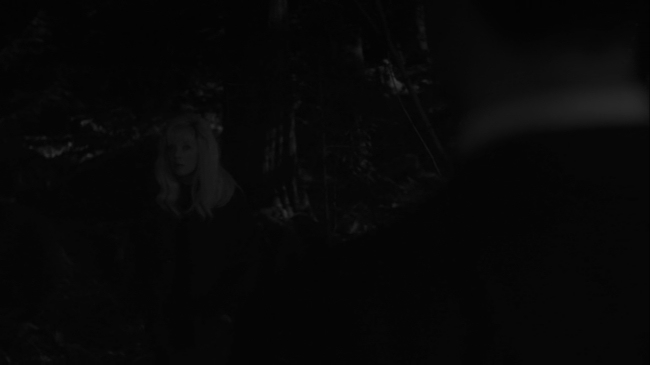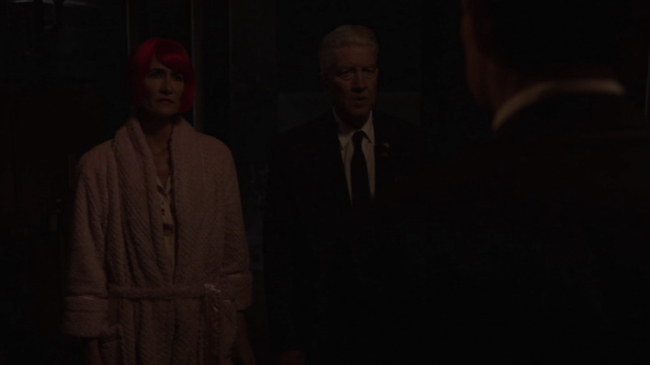
Part of me wonders how I can go back to watching any other TV show after Twin Peaks, part of me feels like the brilliance of Twin Peaks has enhanced my viewing experience of everything else. As last night's finale brought home, it is a show about experience, about contemplation of the moment and the potentials that are inherent in every moment. Among many other things, the third, hopefully not final, season of Twin Peaks is the nexus of Hitchcock and Cocteau, where the essence of suspense meets the essence of surrealism in a beautifully, startlingly meaningful way.
Spoilers after the screenshot

It's relatively well known that Laura Palmer's murder in the original series was never meant to be solved, that Lynch and Frost were forced by the network to reveal the killer's identity. The virtue in this original plan became clear to me some years ago when I was watching the series with my sister and I realised how much more interesting every scene must have been for her when virtually any character could be the killer. Like Hitchcock's bomb under the table, there's the suspense of that hidden fact and it compels the viewer to evaluate everything about each of the many characters we meet, to wonder whether some aspect of their surface personality is a reflection or a distortion of some other reality hidden from us.

Like the second season finale, the third season finale brings us more troubling, unanswered questions in the end. Twin Peaks doesn't leave all questions unanswered and not all of the clues lead nowhere--if it did, we'd get used to it and stop being engaged. Andy's (Harry Goaz) mission given to him by the Fireman (Carel Struycken) is fulfilled in a satisfying way as is the destiny of Freddie (Jark Wardle), which seems to have been nothing less than punching out Bob (Frank Silva's picture inside a black ball). The Fireman and the head of Major Briggs (a photo of Don S. Davis) even seem to make sure Mr. C (Kyle MacLachlan) arrives at the sheriff's station after finally getting to the right coordinates, seemingly indicating how sure they were all the right pieces were falling into place. It was an exceptionally well executed conventional showdown plot with plenty of ingenuity and entertaining ideas. I love the fact that Lucy (Kimmy Robertson) shot Mr. C and that the two Coopers somehow finally made her understand cell phones. There's a mysterious logic at play in Lucy's brain--it's easy to say she and Andy are stupid but I think Lynch's point is that what they have is a kind of intelligence organised in a vastly different way from how most of us understand it.

But on the other hand, that's true of everyone. It's easy to demonstrate by looking, for example, at reviews of the Twin Peaks finale. In an otherwise very positive review by Emily L. Stephens of A.V. Club, she feels compelled to note:
Naido being reduced to a placeholder for Diane is another example of Lynch’s clumsy sidelining of non-white characters. In this case, she’s not even a character, but a symbol of a character.

Why does Stephens reach this conclusion? Because most of Lynch's characters are white? In a finale so full of ambiguities, why is Stephens so sure that Naido (Nae Yuuki) is only a symbol of another character? We can interpret it like Stephens but we can as easily interpret it many other ways. For example, how do we know Diane (Laura Dern) isn't a symbol for Naido?
Naido's name is almost "Diane" in reverse. It becomes "Odian" when spelled backwards. Maybe meaning "Oh, Diane" or possibly "Zero Diane". The Twin Peaks wiki also has this explanation:
In Japanese Buddhism, the term naidō (内道) literally translates to "Inner Path," simultaneously describing "inner teachings" or "[one] within the path" of nature and righteousness.
Is Naido really Diane, or is her assuming the form of Diane a response to Cooper's (Kyle MacLachlan) need?
Incidentally, I recently learned about the second kanji in naido, 道, which means "way". The box on the right represents a severed human head and the line on the left represents a road--it represents an incident in ancient times when a conquering army left the severed heads of their enemies all along the road on their way back to their castle. In could be a coincidence but we've sure seen plenty of severed heads along the path this season.

The seemingly straight forward action climax shifts at one point to having footage of Cooper's stunned face overlaid on the increasingly strange occurrences in Truman's (Robert Forster) office. Like Phillip Jeffries in Fire Walk with Me, the close up of Cooper's face says that we live inside a dream and, indeed, things start to seem more and more dreamlike, especially when Candie (Amy Shiels) and the two other girls working for the Mitchum brothers bring in baskets of snacks. It is a good thing they made so many sandwiches but when did they make them and how did they know so many people were going to be there? Cooper, Diane, and Gordon (David Lynch) going to the boiler room under the Great Northern feels even stranger.

In episode 18, it becomes even clearer that Lynch's aim is to present scenes that do have a meaning but which also require interpretation from the viewer. Information given to Cooper by the Fireman at the beginning of season three starts to come into play--Cooper had been told back then to look out for the number 430 and we see him and Diane drive 430 miles out from some unmentioned location. Then, after checking into a motel, they make love, after which Cooper finds a note that seems to indicate he and Diane have become the Richard and Linda mentioned by the Fireman way back. I love how Lynch's sex scenes aren't just extended ways of saying, "They had sex." Each one is a vital and distinctive part of the story. This one had some things in common with the sex scenes in Lost Highway and there's a sense that Cooper's identity is becoming strange to Diane in this moment of physical intimacy. Her hands seem compelled to cover his face and in the note the next morning "Linda" says that she no longer recognises the person "Richard" has become. Before this, Diane has a vision of herself outside the motel and all together it seems that travelling between worlds has once again required the travellers to inhabit other identities and stories.

But Cooper is still Cooper. It seems twenty five years in the Black Lodge have taught him some magic. But what is he doing? Still trying to save Laura Palmer (Sheryl Lee)? Is this the story of the little girl down the lane? Is it like Scottie in Vertigo, trying to make reality into a story about himself, a lawman, saving a beautiful woman from untimely death? The chivalrous knight is quick to protect the waitress (Francesca Eastwood) from three assholes in Judy's diner.

In the end, it seems to become a masterfully executed nightmare about a time travel story. Like the season two finale, everything seems to crash into enigmatic disaster. Jeez, I hope there's going to be a season four. I want to know what happens with Bobby and Shelly, what happened to Becky, what the deal is with Candie, I want to see more of Tammy Preston. In short, I want more. But I probably always will.
Twitter Sonnet #1030
Refreshing xylophone appraised the ice.
The party cooled beyond martini chill.
A name too far in sloth exchanged for rice.
A pie awaits upon the autumn sill.
The steam is pressed against the kettle's gut.
The melting air appears on ev'ry brow.
To screaming heat no window now can shut.
A boiling tide consumes the dipping bow.
Two birds ingest a single stone again.
The dream advanced behind the forward moon.
The only chance became a pyrrhic win.
An endless quest may also end too soon.
The absent eyes invite the seer home.
A skipping sound compels the dream to roam.

No comments:
Post a Comment